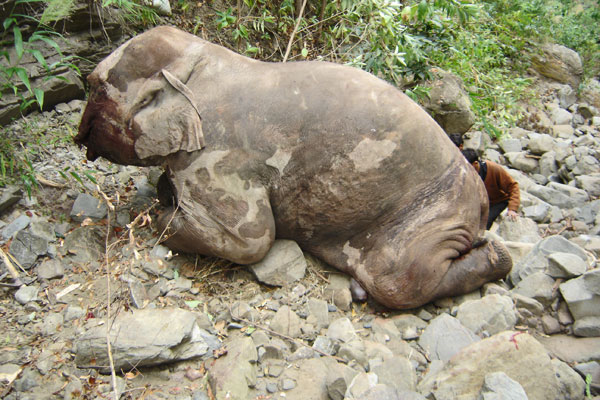Media Release | 12 February 2014, New Delhi
The London Conference on Illegal Wildlife Trade that takes place from 12-13 February, is an opportunity for governments to commit to finally ending the illegal trade in elephants, rhinos, tigers and other endangered wildlife species whose very survival is in crisis due to rampant poaching for illegal trade.
The event is being hosted by UK Prime Minister David Cameron and Foreign Secretary William Hague. The Prince of Wales and his son HRH The Duke of Cambridge will attend London Conference events. The Department for International Development (DFID) and the Department for Environment, Food and Rural Affairs (DEFRA) have joined forces for the first time in the fight against international wildlife crime. Justine Greening and Owen Paterson have announced a £10 million DFID funded package to support efforts by the UK and other countries to tackle illegal trade in wildlife products including rhino horn and elephant ivory.
The current poaching epidemic impacts the world’s most iconic species. The number of rhinos poached in South Africa alone increased to over 1,000 last year from only 13 six years ago. There are as few as 3,200 tigers remaining in the wild, and over 20,000 African elephants were illegally killed in 2012. The poaching in these species remains unacceptably high despite much international discussion. The Conference will work on some solid steps to reverse the declines in these and other species adversely affected by illegal wildlife trade.
WWF and TRAFFIC, which is a joint programme of WWF and IUCN, have been providing expert inputs to the preparatory process for the conference and reception. “Although the London conference is mainly highlighting the plight of Rhinos, Tigers and Elephants, there are many other species that are threatened by the destructive and pervasive illegal wildlife trade,” said Dr Shekhar Niraj, Head of TRAFFIC in India, who participated, representing India, in four of the teleconferences of Senior Officials Group preceding to the London Conference. “Action to stem trafficking of iconic species should benefit some of the lesser known wildlife, such as pangolins.”
Priority issues to be addressed in London include strengthening law enforcement and criminal justice, reducing demand for illegal wildlife products, and supporting sustainable livelihoods for communities that live alongside wildlife. Government delegates are expected to issue a London Conference Declaration, that should establish a road map for the response to the global poaching threat, with a clear description of what actions will be taken and by whom as well as firm commitments to supply the financial, human and technical resources needed to ensure it can be implemented effectively.
Illegal wildlife trade is a global problem, but its roots are local. WWF and TRAFFIC are also calling on governments at the London Conference to announce national-level actions to tackle poaching and reduce the demand for wildlife goods.
For more information, please contact Shubhobroto Ghosh at TRAFFIC in India at 9953965242.
TRAFFIC is the leading non-governmental organization working globally on trade in wild animals and plants in the context of both biodiversity conservation and sustainable development. TRAFFIC is a strategic alliance of IUCN, the International Union for Conservation of Nature, and WWF. In India, TRAFFIC carries out research and provides analysis, support and encouragement to efforts aimed at ensuring that wildlife trade is not a threat to conservation of nature in India. In India, TRAFFIC works as a programme division of WWF–India, the largest conservation organization working in the country.


 CI is a non-profit, non-commercial portal that aims to facilitate wildlife and nature conservation by providing reliable information and the tools needed to campaign effectively.
CI is a non-profit, non-commercial portal that aims to facilitate wildlife and nature conservation by providing reliable information and the tools needed to campaign effectively.